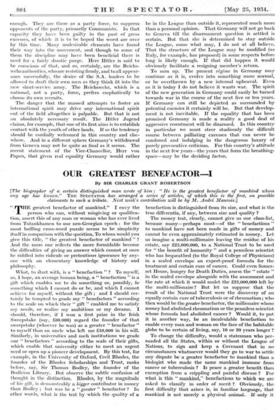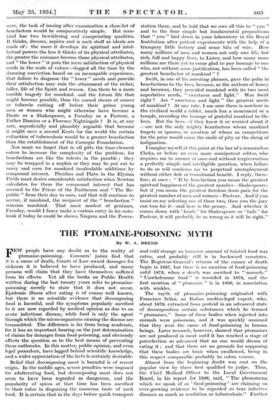OUR GREATEST BENEFACTOR I
By SIR CHARLES GRANT ROBERTSON
[The biographer of a certain distinguished man wrote of him : " He is the greatest benefactor of mankind whom any age has known." THE SPECTATOR has arranged a series of articles, of which this is the first, on possible claimants to such a tribute. Next week's contribution will be by M. Andre Maurois.] " THE greatest benefactor of mankind." I envy the person who can, without misgiving or qualifica- tion, assert this of any man or woman who has ever lived from Tutankhamen to our neo-Georgian epoch : for the most baffling cross-word puzzle seems to be simplicity itself in comparison with the question, To whom would you give this title, " the greatest benefactor of mankind " ? And the more one reflects the more formidable become the difficulties of giving an answer which cannot at once be riddled into ridicule or pretentious ignorance by any- one with an elementary knowledge of history and philosophy.
What, to start with, is a " benefaction " ? To myself, as, I hope, an average human being, a " benefaction " is a gift which enables me to do something or, possibly, be something which I cannot do or be, and which I cannot achieve for myself, without the gift ; and I should cer- tainly be tempted to grade my " benefactors " according to the scale on which their " gift " enabled me to satisfy my needs, or realize my 'ambitions or my dreams. I should, therefore, if I won" a first prize in the Irish Sweepstake (say, £20,000) regard the founder of that sweepstake (whoever he was) as a greater " benefactor " to myself than an uncle who left me £10,000 in his will. Similarly, in universities and such institutions we grade our " benefactors " according to the scale of their gifts, which enable that university either to meet an urgent need or open up a pioneer development. By this test, for example, in the University of Oxford, Cecil Rhodes, the founder of the Rhodes Scholarships and Trust, ranks before, say, Sir Thomas Bodley, the founder of the Bodleian Library. But observe the subtle confusion of thought in the distinction. Rhodes, by the magnitude of his gift, is demonstrably a bigger contributor in money than Bodley ; but was he a " greater " benefactor ? In other words, what is the test by which the quality of a benefaction is distinguished from its size, and what is the true differentia, if any, between size and quality ?
The money test, clearly, cannot give us our class-list, because many—perhaps most—of the " benefactions " to mankind have not been made in gifts of money and cannot be even approximately estimated in money. Let us imagine a multi-millionaire leaving the residue of his estate, say £25,000,000, to a National Trust to be used for " the benefit of humanity " and a penniless scientist who has bequeathed (to the Royal College of Physicians) in a sealed envelope an expert-proof formula for the treatment and certain cure of cancer. Could even Somer- set House, hungry for Death Duties, assess the " estate " in the sealed envelope alongside with the assessment and the rate at which it would. mulct the £25,000,000 left by the multi-millionaire? But let us suppose that the result of the National Trust were the discovery of an equally certain cure of tuberculosis or of rheumatism; who then would be the greater-benefactor, the millionaire whose money had abolished rheumatism or the penniless scientist whose formula had abolished cancer ? Would it, to put it in another way, be an incalculable benefaction to enable every man and woman on the face of the habitable globe to be certain of living, say, 10 or 20 years longer ?
To change the difficulty, would a statesman who per- suaded all the States, within or without the League of Nations, to sign and keep a Covenant that in no circumstances whatsoever would they go to war to settle any dispute be a greater benefactor to mankind than a biologist who made the same mankind immune from cancer or tuberculosis ? Is peace a greater benefit than exemption from a crippling and painful disease ? For what is this " mankind,", benefactions to which we are asked to elf) qsify in order of merit? Obviously, the first difficulty that arises is, in familiar language, that mankind is not merely a physical - animal. If - only it were, the task of issuing after examination a class-list of benefactors would be comparatively simple. But man., kind has two bewildering and exasperating qualities. It thinks, dreams, aspires and is such stuff as ideals are made of : the more it develops its spiritual and intel- lectual powers the less it thinks of its physical attributes, the greater the nuisance become those physical attributes, and " the lower " it puts the mere satisfaction of physical needs in the scale of values—dogged all the time by the damning conviction based on an inescapable experience, that failure to diagnose the " lower " needs and provide their satisfaction may ruin the attainment of the richer, fuller, life of the Spirit and reason. Can there be a more terrible tragedy for mankind, and the future life that might become possible, than the cursed shears of cancer or tubercle cutting off before their prime young men or women who might otherwise have become a Dante or a Shakespeare, a Faraday or a Pasteur, a Father Damien or a Florence Nightingale ? It is, at any rate, superficially and plausibly arguable that because it might save a second Keats for the world the certain extinction of tuberculosis would be a greater benefaction than the establishment of the Carnegie Foundation.
Nor must we forget that in all gifts the time-element enters to increase the complexity of • the problem, for benefactions are like the talents in the parable ; they may be wrapped in a napkin or they may be put out to usury and earn for mankind incalculable additions by compound interest. Pheidias and- Plato in the Elysian Fields must derive considerable satisfaction when Newton calculates for them the compound interest that has accrued to the Frieze of the Parthenon and " The Re- public " from their day to ours, and that will continue to accrue, if mankind, the recipient of the " benefaction " remains mankind. That most modest of geniuses, Faraday, would I fancy make a curious entry in his note- book if today he could be shown Niagara and the Power- station there, and be told that we owe all this to " you " and to the four simple but fundamental propositions that " you " laid down in your laboratory in the Royal Institution after patient experiments with the help of a trumpery little battery and some bits of wire. How many millions of men and women not only owe life, but rich, full and happy lives, to Lister, and how many more millions are there yet to come glad to pay homage to one who, not without some justification, has been called " the greatest benefactor of mankind " ?
Swift, in one of his arresting phrases, gave the palm in benefactions to the bees, because, as the authors of honey and beeswax, they provided mankind with its two most superlative needs, " sweetness and light." Was Swift right ? Are " sweetness and light " the greatest needs of mankind ? At any rate, I am sure there is nowhere in the civilized world a tablet, much less a monument or a temple, recording the homage of grateful mankind to the bees. But the bees—if they knew it or worried about it —are not the only mighty benefactors whom mankind forgets or ignores, or mention of whom as competitors for the prize would cause the smile of pity or the shrug of indignation.
I imagine myself at this point at the bar of a remorseless Cheka, or before an even more omnipotent editor, who requires me to answer at once and without tergiversation a perfectly simple and intelligible question, when failure to do so will condemn me to perpetual unemployment without either dole or transitional benefit. I reply, there- fore, at once : " If by benefaction you mean the greatest spiritual happiness of the greatest number—Shakespeare; but if you mean the greatest freedom from pain for the greatest number of men and women—Pasteur. And if you insist on my selecting one of these two, then you the jury can toss for it—and here is the penny. And whether it comes down with ' heads ' for Shakespeare or ' tails ' for Pasteur, it will probably be as wrong as it will be right."

















































 Previous page
Previous page